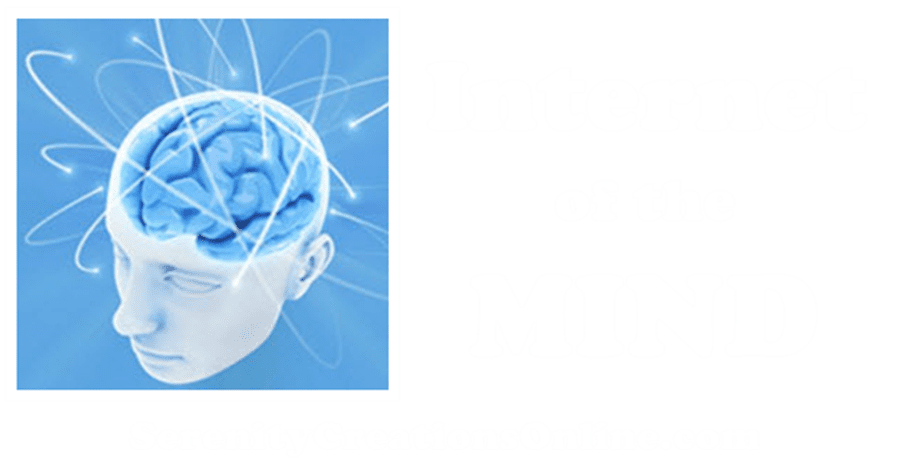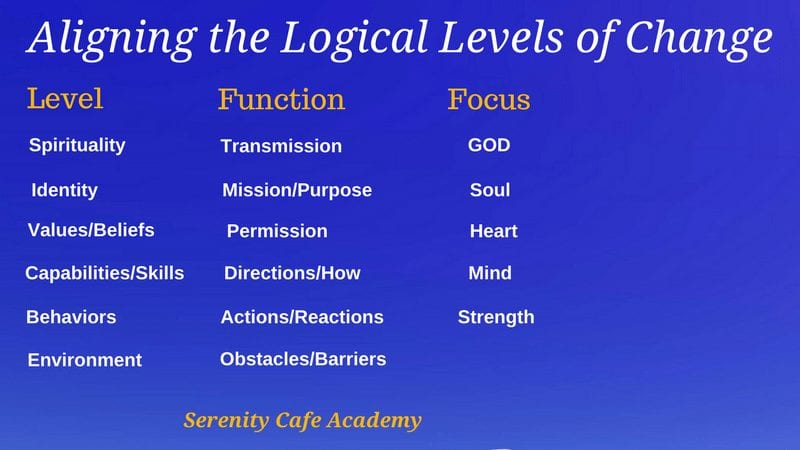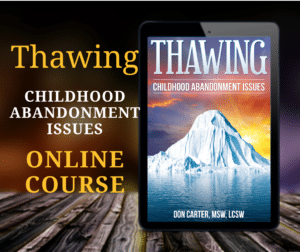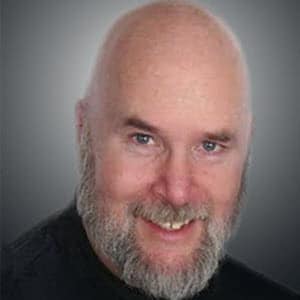
NLP Logical Levels of Change
Using the Logical Levels for Alignment of Self
Learn More: Thawing Toxic Relationships Online Course
As noted in the Stages of Change, if the Action Plan for change is inadequate, a recycling or relapse will occur sending the person “back to square one” or “back to the drawing board” of Contemplation again where they must start over… or give up and decide the change is not possible. Be sure to check out the information on Alignment of the Logical Levels while you are here.
The NLP Logical Levels of Change:

- Spirituality – Change for whom and/or what purpose?
- Identity – Does change reflect who I am?
- Values and Beliefs – Why make the change?
- Capabilities & Skills – Change how?
- Behaviors – Change what?
- Environment – Where to change?
Gregory Bateson, a well known cultural anthropologist, pointed out that in the processes of learning, change, and communication there were natural hierarchies. The function of each NLP logical level in the hierarchy was to organize the information below it. Changing something on a lower NLP logical level of the hierarchy could, but would not necessarily affect the levels above it.
However… making a change at an upper level would necessarily change everything below it in order to support the higher-level change. In other words, “whatever is on top runs everything underneath”… so if you make a change at a lower level but the problem is at a higher NLP logical level then the change is not likely to last.
NLP Logical Levels – Environment:
Where do I need to change?
In describing each level of the hierarchy we will begin at the bottom and work our way up. One reason we start here is because the lowest NLP logical level of change is the easiest to change. This is precisely why most of us start with our environment when we first enter the Contemplation Stage of Change… When we are experiencing pain in our lives we often have an instinct to blame someone or something “out there” in our environment for the problem.
For example, have you ever heard any of these statements…
- “If you would quit doing that, I wouldn’t have to feel this way.”
- “If my boss would get off my back I could do much better at work.”
- “If I had more money, I could go to college. Then I wouldn’t be trapped in this crummy job.”
- “If we didn’t live in this boring town, I wouldn’t have to drink.”
In these examples, the proposed changes are the result of denial, deletion, and distortion… they can keep us stuck in our problems. But sometimes there are obstacles and barriers in our environment that need to be removed when we want to change some aspect of ourselves or our lives…
In the case of recovery, there is a saying, “we must change our playgrounds, playmates, and playthings” in order to recover… Put another way, we need to let go of the people, places, and things that support our addiction. In fact, the environment is where we have built the external networks of people, places, activities, and things that support our codependency, addiction, or depression.
When we consider the concepts of pattern matching and Pavlovian triggers it becomes very apparent why these changes are necessary… It is incredibly difficult – if not impossible to stop compulsive behaviors in a “trigger-rich” environment.
NLP Logical Levels – Behaviors:
What do I need to change?
In NLP terms, behavior refers to what you think about as well as your actions. When we have a deeply ingrained problem network such as depression, anxiety, or addiction – what do you suppose we spend the majority of our time thinking about?
Each time the problem network is activated we begin thinking about it… those thoughts progress to fantasy… fantasy to obsession… obsession to compulsion, and compulsion to acting-out. In this NLP logical level it’s not always the behaviors we choose — but the behaviors that seem to choose us that seem to cause problems. How many of us have experienced feeling mad at ourselves while saying “Why do I always do that!” or “Man, I hate it when I do that!”
Our neural networks are loaded with attitudes and behaviors that have been designed to support our problem feelings, thoughts or behaviors. Couples can get caught up in behaviors that cause each of them to react to the other in cycles that go nowhere fast! We may NOT have solution-oriented behaviors and attitudes installed yet… These will have to be learned, practiced, and practiced again so we can establish, grow, and maintain a neural network for a new, more effective way of doing things.
NLP Logical Levels – Capabilities and Skills:
How do I make these changes?
What are the skills and abilities that we currently possess that will help us get the changes we want at this NLP logical level? We must also identify the skills that we need but have not yet learned in order to make the needed changes.
Perhaps we want to go back to school acquire skills for a new career, take some training in our current job in order to get that promotion, go to a marriage encounter class to enhance our abilities to communicate or take up pottery in order to add more fun to our lives.
Once we have identified and learned the new skills, we must repetitively practice them to gain competence and mastery with them. In cases where we have emotional woundedness, the new skills we need to acquire may be the building blocks for a new neural network called recovery – the alternative to codependency, addiction, chronic depression and anxiety.
A good example of a crucial new skill is developing the ability to cope with feelings in a healthy way. Those of us who grew up in a less-than-nurturing-family system were not taught healthy emotional coping skills. There were certain unspoken rules in our families, such as Don’t Trust, Don’t Talk, and Don’t Feel. All three of these rules must be broken in order to develop effective skills at this NLP logical level.
In order to learn the new skills we need, we must first know what they are and where to find them. This helps us understand why being with groups of other people in recovery is one of the most important new habits we must develop. There are many groups to choose from… church groups, community support groups, therapy groups, 12 steps groups, online groups such as – online forums, email, and chat groups.
At recovery groups and meetings we have an entire hour of listening to the “experience, strength, and hope” of others. Since we all have our own map of the world is a lot of diversity in the perspectives being shared about recovery – we simply take what we need and leave the rest.
The ideas, values, experiences, and beliefs of those who have “been there and done that” provides us with much needed “how-to” data for this NLP logical level that did not get installed in our family of origin. We learn such things as reaching out to others, learning to trust, what it’s like to feel safe in a group, self-disclosure, being accepted for who we are, being loved even before we can love ourselves – you know, all that stuff that goes with healthy intimacy.
We must also read recovery literature specific to our particular problem feeling or behavior in order to gain the knowledge necessary to achieve and maintain recovery. How many books and pamphlets do we digest when we discover we have a serious illness such as heart disease? It is no different here.
Prayer and meditation are also some of the most important recovery skills we need to develop – especially at the NLP logical level of spirituality. Since we have relied so much on something outside ourselves for comfort and relief, we lost touch with our Higher Power which is the main source of our ability to generate comfort from within.
What many of us did when we felt bad and wanted to feel better was to act-out our addiction… Even when we felt good and wanted to feel better… we acted-out our addiction to food, work, drugs, sex, gambling, shopping, drinking, etc. Studies have indicated that people who self-medicate with an object or event have trouble creating alpha waves in their brain – i.e. the relaxation response – in recovery.
There are many ways to teach your brain to create these important brainwaves such as guided imagery, hypnosis, relaxation training, soothing background sounds, aromatherapy, etc. Notice that all of these methods involve the use of our sensory input channels (seeing, hearing, touching, smelling, tasting, etc). It is important to include them in your daily routine as soon as possible.
Prayer and meditation are skills that go hand-in-hand… Some say prayer is talking and meditation is listening.
NLP Logical Levels – Values and Beliefs:
Why do I make these changes?
I think of values as fundamental policies for the self that define who we are. They direct our lives and yet often we are not even aware of them. What you believe to be true is not always what I believe to be true. Values are things that are important to us – they are what make us want to get out of bed in the morning, or not.
Things become important to us when we believe they will take us in the direction of that ultimate goal in life – happiness as a state-of-being. It is very difficult to motivate a whole group of people with the same approach. One size does not fit all when it comes to values and beliefs.
Values and beliefs drive us and influence the lower levels of capability, behavior, and environment. These are what give us internal permission to change. Serious problems arise when our values are in conflict with each other. When addiction becomes the number one value in our lives, for instance, every other thing that’s important to us can be negatively affected.
It is very often the case that many people actually lose things that are extremely important to them as a consequence of their addiction…Some have lost everything including their life. I have met many people in my work who have lost total faith in themselves as a result of their problems. Many have said to me, “I don’t think I have any values anymore”.
This is an easy thing to challenge in the newly recovering person. Most people believe that guilt is an indictment against their character… I believe their guilt is actually a testimony to their character. I usually ask them to tell me five things they feel guilty about… so I can tell them five good things about themselves.
For example, when someone tells me they feel guilty about disappointing their parents I tell them that they value being a good son or daughter… When someone tells me they feel guilty about hurting their wife or children I tell them they value being a good husband and father. When I feel guilty it’s an indication that I’m breaking my own rules – I am not living up my own standards of conduct… Like pain, appropriate guilt tells me when I am going in the wrong direction.
Appropriate guilt is a specific form of pain that tells me when my behavior is out of sync with my values. My behavior is what I do… my values describe what I expect of myself and how I define myself as a person…
To discover your values, learn to ask yourself these questions:
- Why did I do that? Why did they do that?
- What factors are important to me in this situation?
- What is important to the other people in my life?
- What do I believe to be right and wrong?
- What has to be true for me to get what I want?
- When do I say ‘must’, ‘should’, and ‘must not’, or ‘should not’?
- What are my beliefs about this person or situation?
- Are these beliefs helpful?
- What beliefs might help me get better results?
- What would someone I admire believe if they were in my shoes?
Beliefs are included in this category with values because it’s hard to separate the two. I believe in my values and I value my beliefs. Beliefs exist at all levels. I have beliefs about my environment, beliefs about my behavior, beliefs about my capabilities and skills, beliefs about my values, beliefs about my beliefs, beliefs about my identity, and beliefs about my spirituality.
Robert Dilts says, “It’s beliefs all the way up” meaning that beliefs have a strong impact on every logical level in the hierarchy. He goes on to identify beliefs as “cognitions that defy logic.” We may know a belief is unhealthy or irrational and limiting to us but still be unable to let it go.
This is because beliefs are not simply thoughts – They are thoughts about things, usually in the future, which cannot be verified, proven or unproven that is “burned into our neurology”… by the repetition of “my experience.” Limiting beliefs usually have existed since we were very young and have continued to strengthen over the course of our lives due to self-reinforcing experiences.
NLP Logical Levels – Identity:
Who am I and do I reflect that in the way I live?
If we think of values as policies for the self, then we can think of identity as my evaluation of my ability to implement those policies. Based upon my record, I may have a very positive evaluation of my ability to live up to my own standards…or a very negative self-evaluation… or an evaluation somewhere in the middle.
If I grew up in a highly dysfunctional home I may have pre-installed filters that suggest I will never be good enough. If so, I have a network of limiting beliefs about myself that program me to fail. My addictions, depressions and anxieties are a part of that “failure network” and provide me with a way of proving over and over again how this is “true”.
With the exception of our values… all NLP logical levels below this one are about choosing our behaviors. This suggests a person is separate from their behaviors – “Who you are” is not always “what you do” – especially when addictions and compulsions are involved.
With a dedication to working as hard as we can on developing a network for success, we will, and must, synchronize our behavior with our values. This new program for success will replace our program to fail. Here are some questions to help you explore your identity. (Don’t worry if you not able to answer some of these questions to your liking yet… most of us have a negatively skewed or biased picture of our identity early on in recovery).
If you like to be amazed, ask these questions every six months and record your answers for review each time you do so:
- How is what you are experiencing an expression of who you are?
- What kind of person are you?
- How do you describe yourself? Do you live up to that? How often?
- What labels do you put on other people?
- How would others describe you?
- Would other people think of you as you want them to?
- What are 5 to 8 of the most important things in your life?
- What is your mission in life? Do you have one?
NLP Logical Levels – Spirituality:
Whom do I serve and for what purpose?
The “beyond identity” NLP logical level connects you with the larger picture when you begin to question your own purpose, ethics, mission, or meaning in life. It brings us to the realms of spirituality and questions of existence. Ask the following questions to get a glimpse of your purpose in life.
- For what reason are you here?
- What would you like your contribution to be to others?
- What personal strengths can you add to the bigger world out there?
- How would you like to be remembered after you die?
- What greater good do you believe in?
- Does that greater good believe in you?
Remember “Whatever is on top runs everything underneath.” This is important because everything we have learned about the Iceberg points to the NLP logical level of identity as the problem. We have an Invented-Self. a False-Self… and a True-Self buried underneath all that woundedness. This being the case, it’s important to go up one NLP logical level to spirituality in order to change everything underneath.
This is the primary reason why the 12-step programs work so well. Eleven of the Twelve Steps of Recovery are spiritual in nature. It’s very important to point out here that religion and spirituality are not necessarily one-and-the-same at this NLP logical level of change.
Religion is seen as the practice of a set of beliefs about God. Spirituality is simply a daily personal relationship with a Higher Power – God as you understand God. Prayer and meditation are the skills used to experience that daily personal relationship with our Higher Power. Remembering that each of us has our own “Map of the World” – which means there are over six billion maps of the world out there – we can understand why we go out of our way to leave this a personal issue…
The term “Higher Power” is meant to be a generic way of respecting individual perceptions and preferences.





